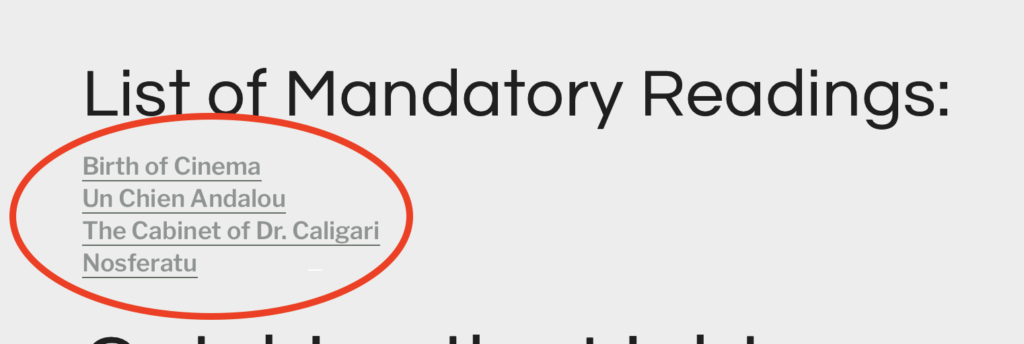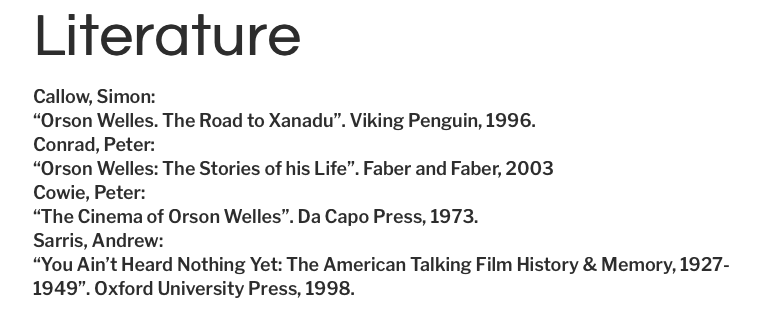Syllabus
Course Contents
Introduction to history of film, like any other historical survey, must start with the dawn of this particular form of art, the most dependent on science and technology. The course will analyze the first attempts to find expressive ways with the aid of the new technology in European and American silent movies. We will also study the development of the film industry and analyze examples of popular genres during Hollywood’s Golden Age. In the second part of the course, student will gain knowledge of the most important stylistic trends in European Cinema after World War II and the avant-garde movements during the seventies.
Learning Material
COMM 220 is a reading intensive course. We will not work with any particular textbook. You will find in every learning module a variety of learning material: online lectures, book chapters, articles and also videos. The examinations will cover the whole course contents. Thus, it is important that you consequently work with the contents of every learning module.
You will find the mandatory readings at the beginning of every learning unit. See the example:

At the end of the lecture, I have added a list of suggested literature about the subjects covered by the course. These books are for your reference only.
Example:

Grading Elements
| Assessment | Value |
|---|---|
| Midterm Exam | 35% |
| Final Exam | 45% |
| Participation | 20% |
Graded Assignments:
Exams
There will be a midterm exam and a final exam. There will be no make-up exams (except for well documented medical emergencies). Exams will cover the contents of the corresponding online lectures. All the material you have need to succeed in this course in available in the Course Contents section of this Website.
Participation
Each Student is expected to participate in the online discussion forums that will appear every week in the course’s home page. The participation grade will be based on the regularity of your participation and the quantity and quality of your entries.
Late Assignments
Late assignments will be graded so that you receive feedback, but will be worth only half credit (100 pt. paper receives 50 points). This is a severe penalty; it is not fair to others who met the deadlines if we accept yours late. The instructor will not accept any assignment more than one week late. In the 21st century, printer troubles or computer problems are no longer reasonable excuses for late papers. The instructor suggests knowing the equipment well enough and allowing ample time in case of problems.
Policies
Please Note: The instructor reserves the ultimate right to modify the schedule of activities, assignments and tests for the class as it deems necessary. In addition, the professor reserves his rights to assess the overall ability of the students to meet the expectations of the course and will exercise his right to pass or fail the student accordingly.
Incompletes
The University’s policy on the awarding of incompletes is discussed in the catalog and will be followed in this class.
Academic dishonesty
CCSU has a zero tolerance policy on academic dishonesty. Academic dishonesty includes cheating on homework or exams, and also plagiarism. The unauthorized use of AI can also be regarded as academic misconduct (for instance, the use of AI tools – ChatGPT, or similar – to answer multiple choice, true/false or short essay questions). In written assignments, submission of AI generated text as the own work is considered plagiarism. Demonstrated cases of academic dishonesty can result in severe penalties including receiving an “F” in the class.
To learn more about this subject, please read CCSU’s policy of academic misconduct at
http://web.ccsu.edu/academicintegrity/UndergradAcadMisconductPolicy.htm
Special Needs
Please contact me privately to discuss your specific needs if you believe you need course accommodations based on the impact of a disability, medical condition, or if you have emergency medical information to share. I will need a copy of the accommodation letter from Student Disability Services in order to arrange your class accommodations. Contact Student Disability Services, room 241, Copernicus Hall if you are not already registered with them. Student Disability Services maintains the confidential documentation of your disability and assists you in coordinating reasonable accommodations with your faculty.
Diversity Statement
It is our intent that students from all diverse backgrounds and perspectives be well-served by this course, that students’ learning needs be addressed both in and out of class, and that the diversity that students bring to this class be viewed as a resource, strength and benefit. We will present materials and activities that are respectful of diversity: gender, sexual orientation, disability, age, socioeconomic status, ethnicity, race, culture, perspective, and other background characteristics. Please let us know ways to improve the effectiveness of the course for you personally or for other students or student groups. In addition, we have attempted to avoid conflicts with major religious holidays. If, however, we have inadvertently scheduled an exam or major deadline that creates a conflict with your religious observances, please let us know as soon as possible so that we can make other arrangements.
Tentative Course Outline
1st Week: May 27 – 30
Learning Unit 1: Introduction to the Course
- Introduction to the Course
- The Dawn of Cinema I
- The Dawn of Cinema II
MOVIES OF THE WEEK:
- A Chien Andalou (Luis Buñuel, Salvador Dalí, 1928)
- The Cabinet of Dr. Caligari (Robert Wiene, 1919)
- Nosferatu (Friedrich W. Murnau, 1922)
DISCUSSION FORUM: Expressionism vs. Surrealism
2nd Week: June 2 – 6
Orson Welles, Horror Film
- The Film Making of Orson Welles
- Historical relevance
- Stylistic and Thematic Elements in his work
- Horror Film
- Origins
- Style Elements
- Relevant Names
- The Horror Classics
MOVIES OF THE WEEK:
- Citizen Kane (Orson. Welles, 1940)
- Frankenstein (James Wale, 1932)
DISCUSSION FORUMS: Citizen Kane, Frankenstein
3rd Week June 9 – 13
Cinema Noir, Comedy
- Cinema Noir
- The Origin of Noir
- Thematic Characteristics
- Style Elements
- Names and Films
- Comedy
- Silent Period
- Talkies
- Screwball
MOVIES OF THE WEEK:
- Casablanca (Michael Curtiz, 1942)
- Bringing Up Baby (Howard Hawk, 1938)
DISCUSSION FORUMS: Casablanca, Bringing Up Baby
Midterm Exam (June 13)
4th Week June 13 – 20
The Western, Italian Neorrealism
- The Western
- The Place of Western in American Culture
- The Epic Hero
- Recurrent Motives
- Italian Neorealism
- Definition
- Historical Background
- Thematic and Stylistic Elements
- Filmmakers
MOVIES OF THE WEEK:
- The Searchers (John Ford, 1956)
- The Bicycle Thief (Vittorio de Sica, 1948)
DISCUSSION FORUMS: The Searchers, Bicycle Thief
5th Week June 23 – 27
Nouvelle Vague
- Nouvelle Vague
- Auteur
- New Wave
- Directors
MOVIE OF THE WEEK:
- Breathless (Jean-Luc Godard, 1960)
